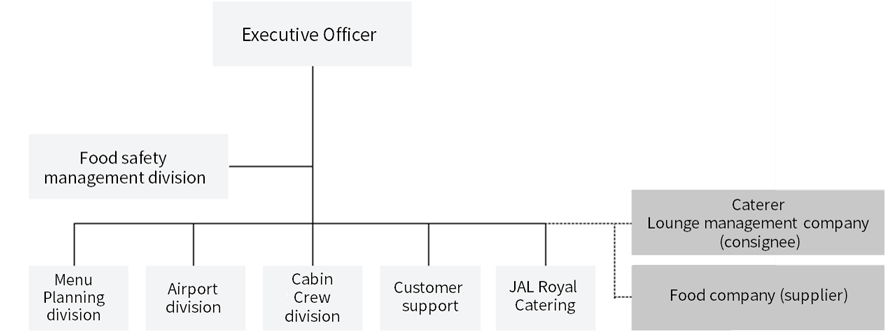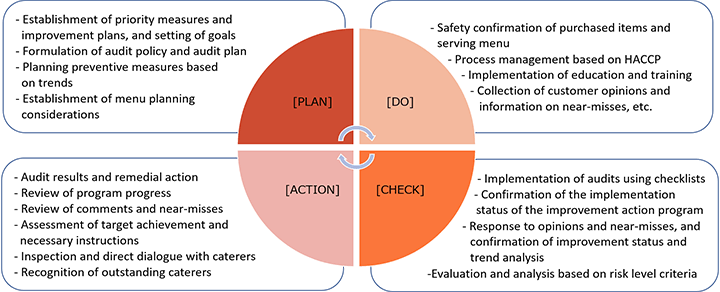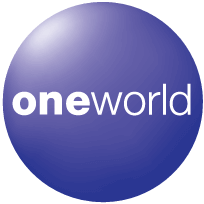Food Safety Assurance
Food Safety Initiatives in Inflight and Lounges
-Providing Safe and Secure Meals to Passengers-
JAL has established a safety management system that covers all processes up to the delivery of meals, and is working on a daily basis to ensure that our customers can enjoy safe and secure in-flight and lounge meals.

Serving process of in-flight/lounge meals
Food Safety Management System
The Executive Officer in charge is constantly checking to ensure that the food safety management system is functioning at a high level.
The Food Safety Management Division provides advice and recommendations to the officer in charge from a professional perspective. In addition to JAL Royal Catering, the JAL Group's in-flight catering company, we also conduct hygiene audits of contracted in-flight catering companies (caterers) and lounge operators to confirm corrective measures and areas for improvement, and collect information on a wide range of food safety issues to make necessary improvements through risk assessment and analysis of actual operations. We also collect information on a wide range of food safety issues and make necessary improvements through risk assessment and analysis of actual operations. In addition, we are also working to improve our knowledge and auditing skills by conducting internal training and attending external training courses.
In the airport division, we have assigned a food safety officer to check the sanitary conditions at the caterer factory and collect information on near-misses in the lounge, which is reported to the food safety management division. When cabin crew members receive feedback from customers, they report it to the Customer Support Office, which promptly shares it with the Food Safety Management Division, including feedback received directly from customers, and analyzes the information. In addition, we are building a stronger safety management system through cross-sectional efforts that include external parties such as caterers, lounge operators and suppliers.
In order to provide safe and secure food that our customers can trust, the JAL Group has implemented the following food safety management system for consolidated subsidiaries that handle food, such as JAL Royal Catering Co.
(Note that consolidated subsidiaries that handle food, such as JAL Royal Catering, account for less than 10% of the JAL Group's total business scale.

Food Safety Management Organizational Structure
PDCA in Food Safety Management

Standards
- The Hygiene Management Manual, which is based on relevant laws and Codex*1 in each country, defines the hygiene standards to be complied with, including risk judgment criteria, audit check items, and methods for analyzing near-miss trends.
- Caterers and lounges have established procedures to ensure appropriate management in accordance with the contents of the Hygiene Management Manual.
*1 International food standards jointly established by the Food and Agriculture Organization of the United Nations (FAO), a specialized agency of the United Nations, and the World Health Organization (WHO)
Audits
- JAL's own periodic hygiene audits are conducted by experts in the Food Safety Management Division with knowledge of HACCP*2 and FSSC22000*3 to ensure that hygiene management standards appropriate for the JAL brand are being strictly controlled. Hygiene audits are conducted twice a year on caterers at all operating sites and regularly on self-operated lounges, after which the airport department confirms that improvements have been made in response to the findings and advice.
*2 HACCP (Hazard Analysis and Critical Control Point): A management method to ensure safety by continuously controlling critical control points for factors that can cause harm in the food manufacturing process.
*3 International standards for food safety management systems
Education
- We provide regular hygiene training for employees who plan in-flight meals and lounge meals, airport hygiene staff in charge of providing hygiene services, and flight attendants, to improve their knowledge and foster an awareness of food safety and a sense of responsibility. We also conduct hygiene audits to confirm that caterers and lounge operators are providing appropriate training to their staff.
Purchasing management
- For new suppliers of processed food products, we have established terms and conditions and conduct preliminary food safety checks to ensure that the products are manufactured under appropriate manufacturing conditions and hygiene management.
- We encourage our food processing suppliers to obtain food safety certifications such as FSSC22000, and to use ingredients certified by GFSI*5, such as ASIAGAP*4, which indicates that they do not use excessive amounts of pesticides or antibiotics.
- For food packaging materials, we also check various documents such as specifications on food safety and quality submitted by suppliers.
*4 A certification given to farms that are committed to food safety and environmental conservation, and is a global farm management standard.
*5 GFSI (Global Food Safety Initiative): An NPO established with the vision of "Safe food for consumers everywhere. Both FSSC22000 and ASIAGAP, which are adopted and recommended by JAL as standard certifications, are GFSI-approved certifications.
Responding to customers with allergies
- We provide customers with information on allergens and nutritional ingredients in accordance with the laws and regulations of each country.
- We develop allergy-friendly menus by incorporating customer opinions, and conduct audits with a particular focus on the presence of contamination. In addition, the guestrooms department implements a variety of measures to prevent the incorrect provision of allergy-compliant meals.
Food Defense
- From the perspective of food defense, we regularly check measures against external intrusion, such as access to cooking facilities and lock control, as well as from the perspective of aviation security.
Participation in External Initiatives
JAL is the first airline to participate in the Ministry of Agriculture, Forestry and Fisheries' GAP promotion program, which is an initiative to ensure food safety, labor safety, and environmental conservation through proper procedures and management when producing agricultural products.

